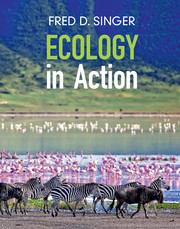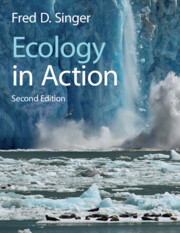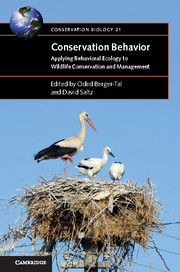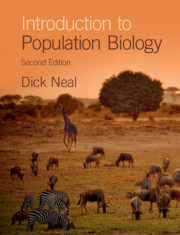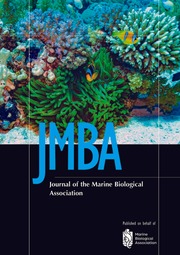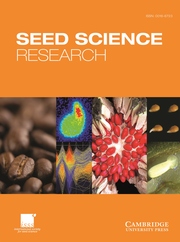Ecology in Action
Taking a fresh approach to integrating key concepts and research processes, this undergraduate textbook encourages students to develop an understanding of how ecologists raise and answer real-world questions. Four unique chapters describe the development and evolution of different research programs in each of ecology's core areas, showing students that research is undertaken by real people who are profoundly influenced by their social and political environments. Beginning with a case study to capture student interest, each chapter emphasizes the linkage between observations, ideas, questions, hypotheses, predictions, results, and conclusions. Discussion questions, integrated within the text, encourage active participation, and a range of end-of-chapter questions reinforce knowledge and encourage application of analytical and critical thinking skills to real ecological questions. Students are asked to analyze and interpret real data, with support from online tutorials demonstrating the R programming language for statistical analysis.
- Strikes the perfect balance in delivering concepts alongside research processes, including four chapters devoted to inspiring ecologists and their research programs, allowing students to develop a deep understanding of how ecologists raise and answer real-world questions
- Written by an experienced and passionate teacher, using an engaging personal narrative and stunning imagery to captivate students and bring this vibrant subject to life
- 'Thinking ecologically' discussion questions integrated within the text encourage active participation, and a range of end-of-chapter exercises support students as they reinforce concepts and apply analytical and critical thinking skills
- Online resources include PowerPoint and JPEG files of all figures, solutions to exercises for instructors, and a tutorial introducing students to the R statistical package and explaining how to use it to solve exercises in the book
Reviews & endorsements
'This is the best ecology text I have seen to date … In 719 pages, Fred D. Singer has produced a work of incomparable excellence and detail for modern ecology … Ecology in Action is worth every penny. A must for anyone studying, teaching or researching ecology.' Pat Sang MRSB, The Biologist
‘In the digital age, creating an effective ecology textbook has become even more challenging. Competition abounds among the numerous available texts, as well as interactive e-books. The authors of this review have been disappointed by several previous works, leading to one of us no longer teaching ecology with a hardbound text. Fred Singer’s Ecology in Action may change that and is likely to impress a number of instructors that have had similar previous disappointments. … Singer’s writing effectively weaves together some of ecology’s greatest hits, both classic and modern to produce interesting, information, and insightful ecology. … high-quality text, one that we are sure is likely to be adopted by numerous universities even in this competitive market. Singer’s Ecology in Action will age well, and future ecologists are undoubtedly going to look at it fondly …’ Howard Whiteman and Nancy Buschhaus, Ecology
'The textbook has a very logical approach, which actually matches the four main syllabus areas of my first year undergraduate course in ecology and evolution. The author says that he has read all the usual textbooks and that is evident. It is very refreshing to read a new textbook, rather than a new edition of an old textbook. The format is very engaging, particularly getting students to think about different types of exam questions at the end … The case studies bring the chapters to life, which contributes to making this a very interesting read; ecology textbooks can be theory-heavy, which makes them very dry. The structuring of chapters is very intuitive and builds on previous chapters, as a lecture course would. However, a chapter could be read out of order too as explanations are very clear.' Judith Lock, University of Southampton
'Ecology in Action by Fred D. Singer was designed for ecology instructors who believe students learn best when they actively engage in thinking about and applying concepts. Basic theories are illuminated with stories about how particular ecologists developed research programs that helped solve environmental problems. Like many general ecology texts, this book emphasizes how to rigorously test hypotheses. Boxed inserts and a companion website provide concise instructions on how to use basic statistical procedures to answer questions. In contrast to most other science textbooks, however, Singer’s book also emphasizes the roles of curiosity and careful observation in discovering hypotheses that are worth testing. This will be an ideal ecology text for anyone who would like to help students appreciate the excitement of scientific creativity.' Robert Askins, Connecticut College
'Fred D. Singer’s Ecology in Action is an excellent resource for students and young professionals seeking to fortify their knowledge of ecological science. In this book Dr Singer provides a detailed overview of the foundations in ecology while he seamlessly incorporates an illuminating insight on how ecology is done. This is a welcome perspective in an ecological textbook since many contemporary titles heavily focus on abstract ecological concepts. Dr Singer uses numerous ecological studies to guide the reader along paths of deductive reasoning, which results in a thorough understanding of ecology’s many patterns and processes. With this approach he provides readers with a comprehensive overview of ecology, and with an accurate view of what is involved in conducting ecology. Considering the numerous review questions, critical thinking exercises, and online resources that this book provides, readers are assured to discover many exciting ideas in ecology.' Joris van der Ham, George Mason University, Washington, DC
'The text is written in a very student friendly manner. One that all students should enjoy reading to learn and understand the basics of ecology. Case studies incorporated into the text provide a much needed basis for the comprehension of difficult ecological concepts.' Troy Ladine, East Texas Baptist University
'This book is a breath of fresh air. Singer has provided a clear and compelling text that will engage students at every level of knowledge. Students will find the text easy to read and the emphasis on research combined with ecological principles refreshing. The integrated questions and case studies provide excellent launch points for classroom discussion.' Holly Porter-Morgan, City University of New York
'Having used most of the 'standard' general ecology textbooks at one time or another (along with a few not so standard ones), I’m excited by this book. It is refreshing and interesting with unique examples and clean artwork that make for a relatively engaging read that I believe most students will enjoy. The inclusion of an assortment of end of chapter questions (along with others embedded in the text) that run the gamut from application to data analysis will give students practice and insight into both critical thinking and quantitative skills that most books do not. The end of unit chapters about practicing ecologists are fascinating and unique in my experience and can only serve to interest students in how 'real science' occurs.' Lynn Mahaffy, University of Delaware
Product details
September 2016Adobe eBook Reader
9781316447048
0 pages
0kg
555 colour illus. 88 tables 408 exercises
This ISBN is for an eBook version which is distributed on our behalf by a third party.
Table of Contents
- Preface
- Acknowledgements
- Part I. Introduction and the Physical Environment:
- 1. What is ecology in action?
- 2. The physical environment
- Part II. Evolutionary and Organismal Ecology:
- 3. Evolution and adaptation
- 4. Physiological and evolutionary ecology of acquiring nutrients and energy
- 5. Physiological and evolutionary ecology of temperature and water relations
- 6. Behavioral ecology
- 7. Bernd Heinrich - studying adaptation in the field and the laboratory
- Part III. Population Ecology:
- 8. Life history evolution
- 9. Distribution and dispersal
- 10. Population abundance and growth
- 11. Conservation ecology
- 12. The chimpanzees of Gombe
- Part IV. Community Ecology:
- 13. Interspecific competition
- 14. Predation and other exploitative interactions
- 15. Facilitation
- 16. Complex interactions and food webs
- 17. Biological diversity and community stability
- 18. Dan Janzen and Winnie Hallwachs - community interactions and tropical restoration through biodiversity conservation
- Part V. Ecosystem and Global Ecology:
- 19. Ecosystem structure and energy flow
- 20. Nutrient cycles: global, regional and local
- 21. Disturbance and succession
- 22. Geographic and landscape ecology
- 23. The carbon cycle and climate change ecology
- 24. Jane Lubchenco - from the marine intertidal to global service
- 25. Epilogue
- Glossary
- References
- Figure and quotation credits
- Index.

